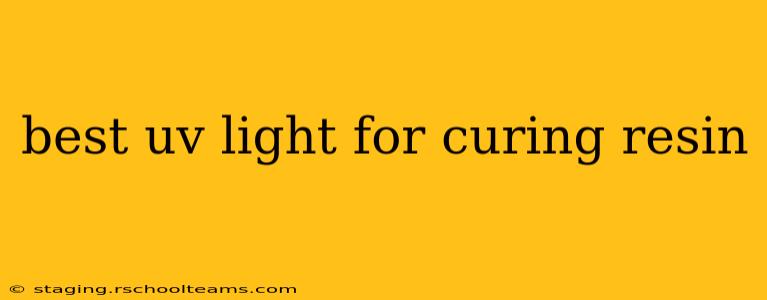Choosing the right UV light for curing resin can significantly impact the final product's quality and durability. Whether you're a seasoned resin artist or just starting out, understanding the different types of UV lights and their capabilities is crucial for achieving professional-looking results. This guide will help you navigate the options and find the best UV light for your specific needs.
What are the Different Types of UV Lights for Resin Curing?
Several types of UV lights are suitable for curing resin, each with its own advantages and disadvantages:
-
UV LED Lights: These are increasingly popular due to their energy efficiency, long lifespan, and instant on/off capabilities. They produce a specific wavelength of UV light, typically 365nm, which is highly effective for curing many resins. They are often more compact and portable than other options.
-
UV Fluorescent Lights (UV-A): These are a more traditional option and generally less expensive than LEDs. However, they have a longer warm-up time, shorter lifespan, and can generate more heat. They also offer less focused curing power compared to LEDs.
-
UV Nail Lamps: While affordable and readily available, these lamps often have lower power output than specialized resin curing lights, potentially leading to incomplete curing or uneven results. They are best for small projects or quick fixes.
-
UV Flashlights: These offer portability and are suitable for spot curing or smaller projects, but might take longer to cure larger pieces of resin.
What Wavelength of UV Light is Best for Curing Resin?
Most resins are formulated to cure effectively under UV light with a wavelength around 365nm. While some resins might respond to other wavelengths, 365nm is the most widely compatible and generally considered the optimal wavelength for consistent results. Always check the manufacturer's recommendations for your specific resin to ensure optimal curing.
How Much Power (Watts) Do I Need in a UV Light for Resin Curing?
The wattage of your UV light directly impacts curing time and effectiveness. Higher wattage generally leads to faster curing, but this also means increased heat generation. A good balance is crucial. For smaller projects, a lower wattage (e.g., 9W-12W) might suffice. Larger projects, thicker resin layers, or faster curing requirements might necessitate a higher wattage (e.g., 36W or higher). Consider the size and thickness of your resin pieces when making your decision.
What are the Key Features to Look for When Choosing a UV Light?
Beyond wattage and wavelength, several other features should be considered:
-
Timer: A built-in timer allows for precise control of curing time, preventing over-curing or under-curing.
-
Adjustable Intensity: The ability to adjust the intensity of the UV light can be beneficial for fine-tuning the curing process depending on the resin and project.
-
Durability: A sturdy and well-built light will withstand regular use.
-
Safety Features: Some UV lights incorporate safety features such as automatic shut-off mechanisms.
-
Portability: If you plan on working in various locations, a portable UV light is advantageous.
How Long Does it Take to Cure Resin with a UV Light?
Curing time depends on several factors: the type of resin, the thickness of the resin layer, the wattage of the UV light, and the distance between the light and the resin. Always follow the manufacturer's instructions for your specific resin, but expect curing times to range from a few seconds to several minutes. Thicker layers will naturally take longer to cure completely.
Are there Any Safety Precautions I Should Take When Using a UV Light for Resin?
Yes, always wear appropriate UV protective eyewear when using UV lights to prevent damage to your eyes. Also, ensure adequate ventilation and be mindful of the heat generated by higher-wattage lights. Some resins can emit fumes during curing, so working in a well-ventilated area is recommended.
By carefully considering these factors and selecting a UV light that matches your needs and budget, you can ensure successful and high-quality resin projects. Remember, always consult the manufacturer's instructions for your specific resin and UV light.
